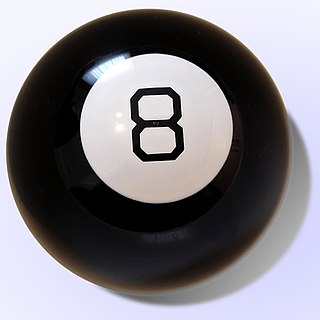Magic 8 Ball
Toy fortune telling device From Wikipedia, the free encyclopedia
The Magic 8 Ball is a plastic sphere, made to look like an oversized eight ball, that is used for fortune-telling or seeking advice. It was invented in 1946 by Albert C. Carter and Abe Bookman and is manufactured by Mattel.[1] The user asks a yes–no question to the ball, then turns it over to reveal an answer that floats up into a window.
 The Magic 8 Ball | |
| Type | Novelty toy |
|---|---|
| Inventor(s) | Albert C. Carter Abe Bookman |
| Company | Mattel |
| Availability | 1950–present |
| Materials | Plastic Alcohol Blue coloring |
| Official website | |
Origin
The functional component of the Magic 8 Ball was invented by Albert C. Carter,[1] who was inspired by a spirit writing device used by his mother, a Cincinnati clairvoyant.[1] When Carter approached store owner Max Levinson about stocking the device, Levinson called in Abe Bookman, Levinson's brother-in-law, and graduate of Ohio Mechanics Institute. In 1944, Carter filed for a patent[2] for the cylindrical device, assigning it in 1946 to Bookman, Levinson and another partner in what came to be Alabe Crafts, Inc., combining the founder's names, Albert and Abe. Alabe marketed and sold the cylinder as The Syco-Slate. Carter died sometime before the patent was granted in 1948.
Bookman made improvements to The Syco-Slate, and in 1948 it was encased in an iridescent crystal ball. Though not successful, the revamped product caught the attention of Chicago's Brunswick Billiards, which in 1950 commissioned Alabe Crafts to make a version in the form of a traditional black-and-white 8 ball,[3] which was possibly inspired by a gag[clarification needed] in the 1940 Three Stooges short film, You Nazty Spy!.[4]
Cultural impact
Although originally sold as a paperweight, the Magic 8 Ball remained popular for several decades as both an office toy and a children's toy.[3]
In 1971, Bookman sold Alabe Crafts, Inc., to Ideal Toys,[3] which marketed the ball firmly at children. In 1987, the rights were again sold to Tyco Toys,[5] spurring on another marketing campaign and resurgence in interest. Tyco Toys was acquired by Mattel, the current manufacturer, in 1997. Despite its numerous owners, the Magic 8 Ball has changed little in design and implementation.
Design and usage
Summarize
Perspective

The Magic 8 Ball is a hollow plastic sphere resembling a black-and-white 8 ball. Its standard size is larger than an ordinary pool ball, but it has been made in different sizes. Inside the ball, a cylindrical reservoir contains a white plastic 20-sided regular icosahedron die floating in approximately 100 ml (3+1⁄2 US fl oz) of alcohol dyed dark blue. Each of the die's 20 faces has an affirmative, negative, or non-committal statement printed in raised letters. These messages are read through a window on the ball's bottom.
To use the ball, it must be held with the window initially facing down to allow the die to float within the cylinder. After asking the ball a yes–no question, the user then turns the ball so that the window faces up. The die floats to the top, and one face presses against the window; the raised letters displace the blue liquid to reveal the message as white letters on a blue background. Although most users shake the ball before turning it upright, the instructions warn against doing so to avoid white bubbles.
While the Magic 8 Ball has undergone very few changes, an addition in 1975 by new owners, Ideal Toy Company, fixed the bubble problem.[6] Its patented "Bubble Free Die Agitator", an inverted funnel, reroutes the air trapped inside.[7] The solution has been used ever since.
Possible answers
The 20 possible Magic 8 Ball answers were designed by Dr. Lucien Cohen, a psychology professor at the University of Cincinnati. The possible answers consist of 10 affirmative answers, five neutral and five negative.[3]
| Affirmative | Neutral | Negative | |
|---|---|---|---|
|
|
|
|
See also
- Divination – Attempt to gain insight into a question or situation
- Flipism – Practice or personal philosophy in which all decisions are made by flipping a coin
- Fortune teller machine – Automaton that prints out reader's fortune
- Ka-Bala – Talking 1967 board game
- Ouija – Flat board for communicating with spirits
Patents
- U.S. patent 2,452,730—Liquid Filled Dice Agitator ca. 1944
- U.S. patent 3,119,621—Liquid filled die agitator containing a die having raised indicia on the facets thereof, 1962
- U.S. patent 3,168,315—Amusement Device ca. 1961
References
External links
Wikiwand - on
Seamless Wikipedia browsing. On steroids.
